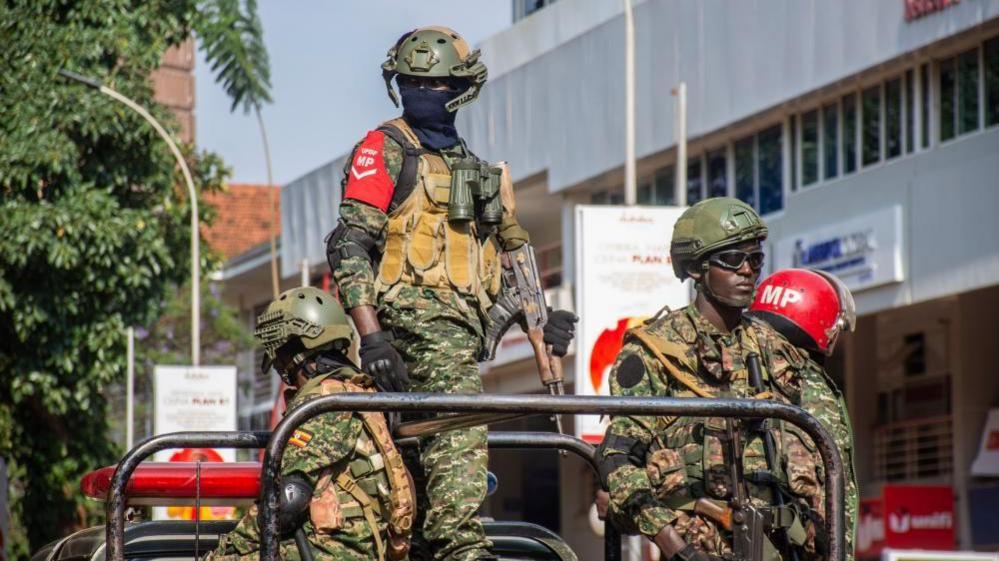Dozens arrested in Uganda anti-government protests

The security forces have been deployed throughout the capital, Kampala
- Published
Dozens of people have been detained in the Ugandan capital Kampala after joining scattered anti-corruption protests in defiance of an official ban.
Lawyers said around 60 people, including a prominent TV presenter and three young protest leaders, were hurriedly brought before courts and remanded in custody following a march on the country's parliament on Tuesday.
President Yoweri Museveni, who has ruled Uganda for almost four decades, had warned before the event that protesters were "playing with fire".
The march was organised on social media amid anger over long-running allegations of corruption involving several high-profile public officials.
The protests were partly inspired by demonstrations last month in neighbouring Kenya which forced President William Ruto to drop planned tax rises.
Police previously announced that they had refused to give permission for the march and would not allow any demonstration that threatened Uganda's "peace and security".
On Tuesday, riot officers were seen manning roadblocks, while members of the security forces sealed off roads and stood guard around the parliament building.
Pictures showed marchers holding signs that read "Stop corruption" and calling the parliament a "den of thieves". Another said: "We are peaceful protesters".
Others showed protesters being manhandled by police and pushed into the back of riot vans.
"We are tired of corruption," protester Samson Kiriya told AFP news agency through the bars of a van after being arrested.
Those detained included well-known television and radio presenter Faiza Salima as well as three protest organisers - George Victor Otieno, Kennedy Ndyamuhaki and Aloikin Praise Opoloje.
Bernard Oundo, president of the Uganda Law Society, said one hearing saw 50 people charged.
"This was a rushed trial. They were arrested and taken to court in a very short time and remanded to prison without securing them bail," he said.
"We will ensure these people receive justice."
On the eve of the march, Uganda's main opposition leader, Bobi Wine, said security forces had besieged the Kampala headquarters of his National Unity Platform party.
He said some of his party officials had been "violently arrested" and that the offices had been turned into a "military barracks".
Writing on X, external following the march, Bobi Wine, whose real name is Robert Kyagulanyi, said: "Salutations to all who have courageously marched and are still marching against corruption and misrule - even in the face of very brutal actions by the military and police!
"The cowards have been picking up young people whose only crime is lifting up a placard."
He added that legal and welfare teams would be made available to those who needed them.
Earlier this year, the UK and US imposed sanctions on a number of Ugandan officials, including parliament speaker Anita Among and three former or serving ministers, over alleged involvement in corruption.
You may also be interested in:

Go to BBCAfrica.com, external for more news from the African continent.
Follow us on Twitter @BBCAfrica, external, on Facebook at BBC Africa, external or on Instagram at bbcafrica, external